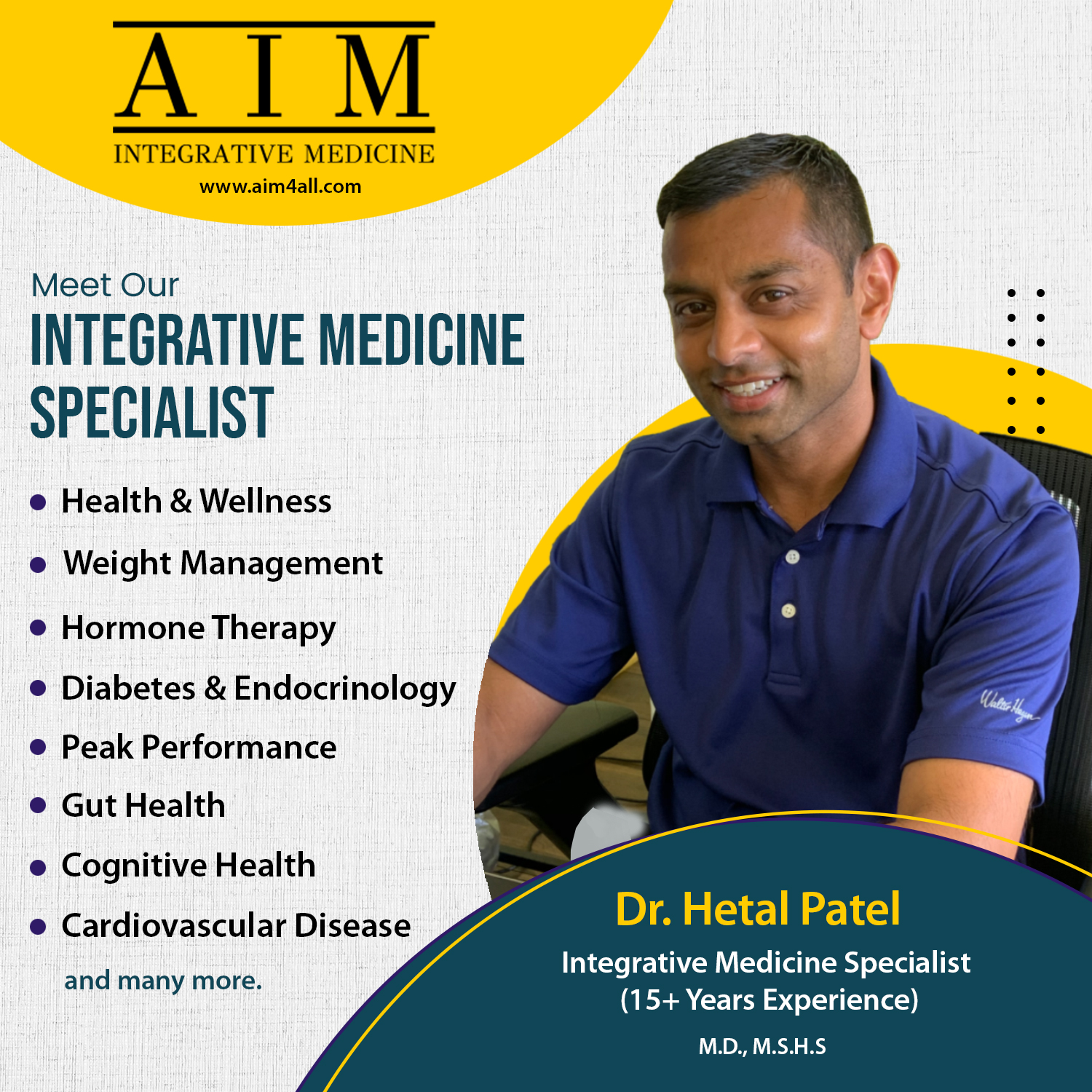Integrative Medicine San Diego
AIM Clinic for Integrative Medicine
AIM Clinic for Integrative Medicine San Diego combines conventional Western medicine along with evidence-based alternative therapies and approaches to prevent, heal and reverse disease. Our expert Dr. Hetal Patel offers an array of holistic medicine and healing modalities, taking all aspects of your wellbeing into consideration — mind, body, and spirit.
What is Integrative Medicine?
Integrative Medicine is a holistic approach to healthcare that combines conventional Western medicine with complementary and alternative therapies. The goal of integrative medicine is to treat the whole person – body, mind, and spirit – rather than just treating a specific symptom or disease by identifying the root cause(s).
Integrative medicine practitioners use a wide range of therapies and techniques to promote healing and wellness. These may include acupuncture, herbal medicine, massage therapy, meditation, yoga, nutrition, and other complementary and alternative therapies.
Integrative medicine is often used in conjunction with conventional medical treatments to help manage symptoms and improve overall health and well-being. It emphasizes the importance of the patient-practitioner relationship and encourages patients to take an active role in their own healthcare by making lifestyle changes, reducing stress, and practicing self-care.
Difference between Integrative Medicine & Functional Medicine
Integrative Medicine and Functional Medicine are both holistic approaches to healthcare that focus on treating the whole person rather than just symptoms or diseases. However, there are some key differences between the two approaches.
Integrative Medicine incorporates a variety of conventional Western medicine techniques and complementary and alternative therapies to promote healing and wellness. It focuses on the relationship between the patient and practitioner, and emphasizes the importance of lifestyle changes, stress reduction, and self-care. It naturally includes functional medicine.
Functional Medicine, on the other hand, is an approach that focuses on identifying and addressing the root causes of chronic diseases through individualized diagnostic and treatment plans. It uses a combination of conventional medical practices and functional testing to identify imbalances and deficiencies in the body’s systems. These imbalances are then addressed through personalized nutrition and lifestyle interventions, as well as targeted supplementation and medications.
They both focus on identifying and addressing the underlying causes of illness, while Integrative Medicine seeks to integrate various forms of therapeutic options to promote healing.. Both approaches can be effective in promoting health and well-being, and the choice between the two may depend on individual needs and preferences.
Integrative Medicine San Diego

Why AIM Integrative Medicine?
At AIM Dr. Hetal Patel takes a whole-person approach to health and wellness. We believe that health is dynamic, continually influenced by how we live our lives and how we relate to the world around us. Importantly, we believe that healing starts from within.
We offer programs designed for specific conditions including, Heart Disease, Health & Wellness, Weight Management, Hormone Therapy, Diabetes & Endocrinology, Gut Health and many more.
15 Most Common Questions About Integrative Medicine
#1 - What is integrative medicine?
A lot of people think that integrative medicine is simply a fancy, more politically-correct term for alternative medicine, but that’s only a piece of the truth.
Integrative medicine is a system of medicine that seeks to use the best treatments for any given ailment. In this way it is an inclusive approach to health and healing founded on the belief that the best medicine is the one that works. It does not discriminate against treatments or techniques based on their origins. This begs the question, however, how do we know what is the best treatment option.
For one, doctors that practice integrative medicine typically avoid treatment options that have a high potential to make things worse especially when there are other options that don’t have this potential. All doctors are trained to “first do no harm.” However many times the dogmatic nature of Western Medicine leaves these doctors few options for treatment.
For instance Western Medicine doctors are trained to use the “standard of care.” Yet for a treatment to reach the level of evidence needed for “standard of care” takes many years and lots of funding. The good part about the standard of care model is it gives us a framework for treatment. The bad part is it often misses a fundamental tenant of being a doctor. That tenant being to solve people’s health care problems. For instance there are many treatment options for all kinds of ailments that work equal or better than “standard of care” yet have less potential for harm. So as an integrative medicine doctor, I say lets use the Western Medicine model for tracking and treating the disease process we see occurring. Yet when it comes to treatment let’s explore the use of herbal supplement or nutrients to treat rather than just the standard of care.
#2 - Will my insurance cover treatments from an integrative medicine doctor?
Sorry to tell you, the answer to this question is “it depends”. It depends mainly on the state where you live, the treatment you are wanting to receive, and the insurance plan you have. Many of our patients and doctor find the insruance complexity and ambiguity quite frustrating. The trend is for insurances (and government law) to incorporate more integrative medicine therapies that were once excluded from coverage.
If you see an integrative medicine doctor that has a license to practice medicine (more on this below), chances are there will be insurance coverage for laboratory testing and medications used. Here in Arizona laboratory and prescription medications are generally covered. Still, insurance policies may insist that the integrative/ alternative medications and labs are not “medically necessary” even with proper coding.
Office visits are less likely to be covered but it does depend on the state. Washington state, for instance, has equal coverage for naturopathic physicians as conventional medical doctors. In cases where your insurance does not cover health saving accounts can help bridge the gap and should be covered.
#3 - What is the need of integrative medicine in present time?
Integrative medicine encourages more time and effort on disease prevention instead of waiting to treat it once it presents. Chronic disease now accounts for much of our health care costs and also causes significant morbidity and mortality.
#4 - Is integrative medicine the same as functional?
#5 - Is integrative medicine a substitute for conventional medicine?
Integrative medicine is an approach to medical care that combines conventional medicine with CAM practices that have shown through science to be safe and effective. This approach often stresses the patient’s preferences, and it attempts to address the mental, physical, and spiritual aspects of health.
#6 - Why is the integrative approach important?
#7 - Is integrative medicine the same as holistic medicine?
#8 - What is another name for integrative medicine?
#9 - Is integrative medicine a combination?
#10 - What are the key concepts of integrative approach?
#11 - What is holistic vs functional vs integrative?
#12 - Is yoga an integrative medicine?
#13 - What is the philosophy of integrative medicine?
#14 - How can integrative medicine help?
#15 - What is integrative medicine if it isn't alternative?
- Integrative Medicine in Carlsbad
- Integrative Medicine in Del Mar
- Integrative Medicine in Escondido
- Integrative Medicine in Lemon Grove
- Integrative Medicine in Poway
- Integrative Medicine in Santee
- Integrative Medicine in Chula Vista
- Integrative Medicine in El Cajon
- Integrative Medicine in Imperial Beach

Recent Comments